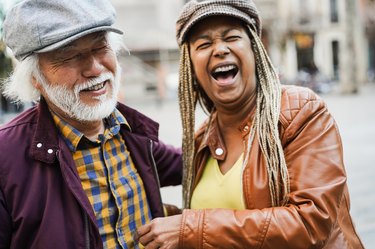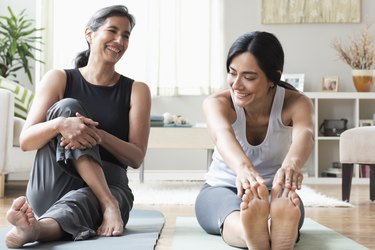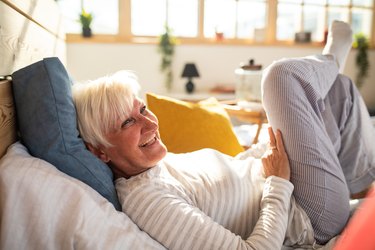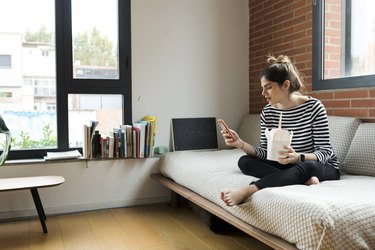
If you have some reservations about getting older, you're not alone. While wisdom of years is welcome, age-related aches and pains don't sound particularly pleasant. Indeed, sometimes we wish we could retain the energy and vigor of our youth.
Though it's typical to experience uneasiness about aging, for people with gerascophobia — an abnormal and persistent anxiety or fear of getting old — the prospect of old age is a serious and scary concern, so much so that it can harm you mentally and physically (more on this later).
Video of the Day
Video of the Day
We spoke with Juhee Jhalani, PhD, a New York City-based clinical psychologist, to better understand this severe age-based anxiety and how to deal with it.
What Are the Signs of Gerascophobia?
"Symptoms [of gerascophobia] mimic the symptomatology of an anxiety attack or a persistent anxiety disorder," Jhalani says.
Symptoms include (but are not limited to):
- Heart palpitations
- Nervousness
- Shortness of breath and breathing problems
- Excessive sweating
- Chills
- Body aches
- Digestive problems
In addition to physical symptoms, certain behavioral patterns are also common among people who have severe age-related anxiety, Jhalani says. For instance:
- Avoidance of people or activities that may trigger a fear of aging
- Excessive use of anti-aging treatments
- Avoidance of activities that may lead to physical deterioration or wearing of one's body
Tip
Talk to your doctor if you're regularly dealing with physical or emotional signs of gerascophobia to access the help you need, Jhalani says.
What Causes Gerascophobia?
Experts aren't quite sure. "We do not know yet whether there is a genetic component associated with gerascophobia, or if it's truly a conditioned or learned behavior," Jhalani says.
But the latter — what you learn or are conditioned to believe about old age — definitely plays a pivotal part, she says. Indeed, your ideas about getting old influence how you feel about it happening to you (including whether you fear it).
Here are some of the things that affect our anxiety about aging:
1. Negative Messaging About Aging in the Media
"Modern society, especially social media, celebrates youthfulness and admonishes aging," Jhalani says. "The social messages associated with aging often trigger negative core beliefs and deeply rooted insecurities, such as [worry about] being unlovable, unworthy or useless."
2. Age-Based Prejudice in the Workplace
While laws technically protect people from age-related discrimination in the workplace, ageist attitudes and practices still systematically disadvantage older adults, according to the Royal Society for Public Health (RSPH).
3. Pressure From the Anti-Aging Beauty Industry
"These negative beliefs [about aging] are monetized and propagated by the beauty industry driven by consumerism," Jhalani says.
"Modern society targets aging as if it's a disease, and the beauty industry wants us to buy potions [and] creams and undergo expensive and painful procedures to undo what nature will eventually do to all of us."
4. Birthdays or Death Anniversaries
Events such as the onset of birthdays or death anniversaries can trigger gerascophobia, Jhalani says. That's because these benchmarks of age remind us of getting older, the fragility of life and mortality.
5. Personal Experiences (or Lack Thereof) With Older People
Witnessing older people in your family and community deal with difficult situations can definitely foster fearful feelings about aging.
This issue is especially timely, as many people found themselves becoming caretakers for their older loved ones during the COVID-19 pandemic when access to support care staff has been limited, Jhalani says.
Alternatively, lack of regular contact with older folks can also perpetuate prejudiced perspectives on aging, per the RSPH. Indeed, without spending quality time with an older person, you only have the negative stereotypes and messages from mass media (and society at large) to inform your opinion on aging.
Tip
Discussing support with a loved one can be difficult. Here's a guide to talking about caregiving to help you tackle these conversations.
Who Gets Gerascophobia?
Anybody can be affected by age-related anxiety, Jhalani says. Here's what it can look like at each stage of life:
Children
Kids worry about growing older because it can trigger separation anxiety or the fear of losing the care and nurturance from their loved ones (who will age and die, too), Jhalani says.
"They may also be fearful of an increase in responsibilities both at school and at home," she says.
In fact, kids as young as 6 years old can harbor negative attitudes about age, according to the RSPH.
Teenagers and Young Adults
Teens and young adults may experience anxiety about losing their vitality, popularity, independence and attractiveness, Jhalani says.
In a national survey of more than 2,000 respondents conducted by the RSPH, millennials ages 18 to 34 were found to have the most pessimistic perspectives about aging:
- 40 percent believed dementia was inevitable with age
- 25 percent believed unhappiness and depression were typical in older age
- 24 percent believed that older people are never perceived as attractive
Older Adults
Older adults may be fearful of illness, death and lack of independence, which is often socially associated with getting old, Jhalani says.
Tip
Older adults are less likely to seek mental health care than younger people, per the RSPH. Regardless of your age, here's a guide to finding a therapist to help you access the care you need to deal with gerascophobia or any other mental health concerns.
How Can Gerascophobia Affect Your Mental and Physical Health?
Gerascophobia can take a toll on your mental health. For instance, research has shown that negative perceptions of aging are associated with a greater risk of depression and stress, according to the RSPH.
What's more, studies show that adverse views on aging (especially related to unrealistic beauty standards) can lead to high levels of body dissatisfaction and lower self-esteem in older people assigned female at birth, per the RSPH.
Many even choose to undergo excessive cosmetic procedures (including serious surgeries) to address age-related changes in their body, Jhalani says.
Making matters worse, gerascophobia can sabotage your social life as it often involves self-imposed isolation to avert anxiety triggers.
For example, "a person may avoid going on a hiking trip with friends, as this may damage their knees, or miss a beach vacation, as it may expose their skin to damaging sun rays and lead to premature skin aging," Jhalani says. An individual may even skip seeing loved ones if they feel unattractive, she says.
But this isolating behavior only exacerbates the problem, because maintaining meaningful social connections is vital to mental health and wellbeing.
And that's not all. Gerascophobia can also harm your overall health in many ways. For instance, people with poor body image may engage in unhealthy eating habits, Jhalani says.
To top it off, research shows that people who believe negative age-based stereotypes may experience poorer physical health outcomes and may live on average seven and half years less, according to the RSPH.
How to Manage Gerascophobia
While we can't outrun time, we can learn strategies for healthy aging. Here are Jhalani's tips for how to deal with getting older:
1. Embrace Aging as a Gift
"Aging is normal and fully natural," Jhalani says. "It can be seen as a gift that not all will receive in their lifetime."
When we think of it like this — that some people die prematurely and don't have the pleasure of growing old — it can help us reframe aging as a privilege.
2. Celebrate Your Wisdom
With age comes wisdom.
"I encourage journaling and documenting the lessons that you have learned with every passing year," Jhalani says. "Maybe you can make it a ritual on your birthday to share your wisdom from the year with your family and friends."
3. See the Value in Your Lived Experiences
Think of how much more you know now than you did 10 years ago. Your lived experience is an asset to all areas of your life, like relationships, activities and the workplace.
You can share your acquired wisdom (and even turn it into something potentially profitable), Jhalani says. For example, document your personal journey with aging by writing a blog or starting a YouTube channel, she says.
4. Prioritize Your Health
"Exercise enough, eat a well-balanced diet and seek prompt medical care when you need to," Jhalani says. "Doing all that you can to encourage graceful aging will help you feel powerful and in control as you navigate through this life journey."
"Surround yourself with peers that are content and happy with their bodies," Jhalani says. A supportive group of friends can help you catch yourself when you start to body shame yourself about normal aging.
6. Focus on What Your Body Can Do
"Be grateful for what your mind and body are capable of achieving on a day-to-day basis," Jhalani says. To help you do this, she suggests jotting down everything your body can do, like hugging a loved one, lifting a heavy box or doing a complex crossword puzzle.
7. Reflect on Your Worth
"Make a list of activities that you engage in daily that reflect your true value in your family, friendships, school, workplace and community," Jhalani says. This will help you recognize the purpose in your existence.
8. Try New Things
"Continue to learn new activities, develop and nurture your hobbies and meet new people," Jhalani says. Having these experiences helps keep life feeling fresh, exciting and challenging.
9. Volunteer
If possible, volunteer in your community, neighborhood or workplace. By contributing to society in even small ways, you help "debunk the myth that aging is associated with uselessness and loneliness," Jhalani says.
10. Look to Role Models
Find people — through your community, workplace, school, family or even social media — who are embracing aging. "Spend time learning about them and the qualities that keep them forever youthful and content," Jhalani says.
This can be particularly helpful for young people with fears related to aging. Forming a friendship with an older adult is associated with fewer ageist attitudes and less age-based anxiety in younger folks, according to the RSPH.
11. Seek Professional Help
No one should have to face the fear of aging alone.
"If your fear of aging is abnormal and persistent and is negatively impacting your daily functioning, seek professional help as soon as possible," Jhalani says.
Is this an emergency? If you are experiencing serious medical symptoms, please see the National Library of Medicine’s list of signs you need emergency medical attention or call 911.


